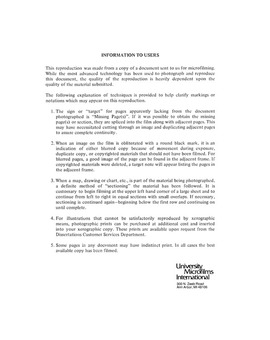| dc.contributor.author | O'hair, Dan. | en_US |
| dc.date.accessioned | 2013-08-16T12:28:35Z | |
| dc.date.available | 2013-08-16T12:28:35Z | |
| dc.date.issued | 1982 | en_US |
| dc.identifier.uri | https://hdl.handle.net/11244/5010 | |
| dc.description.abstract | This study investigated the preference of patients toward various types of physician-communicated message strategies involving treatment recommendation for obesity. Subjects included 303 in-clinic and non-clinic volunteers in a wide range of settings. Subjects were asked to respond to preference items concerning message strategies they read. The message strategies emulated a physician giving information and instructions for the treatment of obesity and each strategy varied in the level of affectivity and information present. Subjects also responded to the receiver apprehension test and the health belief test. The design of the experiment involved a 2 x 2 x 4 design. Several significant results emerged from the study: (1) an instrument was developed which reliably determines preferences for physician communication behavior (PREF). (2) This study found preference for a communication strategy to be positively related to likelihood of compliance with that strategy. (3) It was discovered that individuals differ in their preferences for various physician message strategies. (4) Differences in preferences for strategies can be predicted on the basis of receiver apprehension--high receiver apprehensives prefer low-affective/low-information strategies. (5) A patient's level of health beliefs also can determine preference for a strategy--subjects with high health beliefs (high-compliers) significantly preferred a strategy which included high affect and high information. (6) Receiver apprehension and health beliefs interacted to produce differences in a subject's preference for strategies--subjects high in receiver apprehension and health beliefs preferred a strategy low in affect and information, while low receiver apprehensive, low health belief subjects preferred the high-affect/high-information strategy. | en_US |
| dc.format.extent | viii, 91 leaves : | en_US |
| dc.subject | Speech Communication. | en_US |
| dc.subject | Health Sciences, General. | en_US |
| dc.title | Patient preferences for physician communication behavior : | en_US |
| dc.type | Thesis | en_US |
| dc.thesis.degree | Ph.D. | en_US |
| dc.thesis.degreeDiscipline | Department of Communication | en_US |
| dc.note | Source: Dissertation Abstracts International, Volume: 43-05, Section: A, page: 1346. | en_US |
| ou.identifier | (UMI)AAI8224203 | en_US |
| ou.group | College of Arts and Sciences::Department of Communication | |
